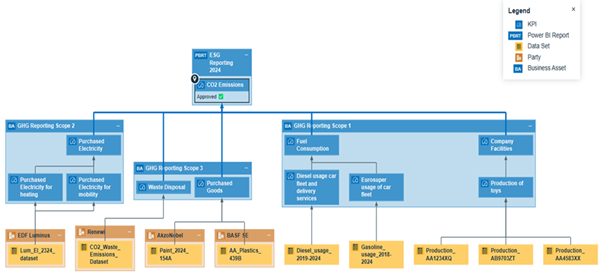How can organizations keep a complete overview of their total CO2-emissions?
Leveraging Collibra for ESG CSRD Regulation Compliance
Challenge
Navigating the Complexities of ESG/CSRD Compliance
As the global focus on Environmental, Social, and Governance (ESG) criteria intensifies, regulatory bodies are tightening requirements for businesses to disclose their environmental impact. The Corporate Sustainability Reporting Directive (CSRD) in the European Union mandates comprehensive reporting on sustainability matters, including carbon emissions.
Complying with these regulations posed a significant challenge for a large retailer in Belgium. The company needed to accurately calculate and report its total CO2-emissions across various operational facets, from supply chain logistics to in-store energy consumption. However, with data scattered across multiple systems and departments, achieving transparency and accountability seemed daunting.
Approach
Harness the Power of Collibra for Data Transparency and Accountability
The need for a robust platform to centralize data and ensure compliance was recognized. Consequently, the decision to utilize Collibra, which was already implemented at the client's site and is an ideal tool to ingest your data sources and visualize lineage, was a logical choice.
The goal was to leverage Collibra's capabilities to define all data sources contributing to CO2-emission calculations, establish ownership for each data source, and link them to the relevant ESG indicators mandated by the CSRD. Following components were crucial in reaching this goal:
1. Clear process to link data sources with ESG indicators:
A lot of Data Sources were already in place in Collibra thanks to previous use cases. This metadata could be used to link to the relevant indicators. Together with this client, we defined a clear process to do this and created training materials for the responsible people within the Sustainability department.
2. Data Lineage:
With Collibra's data lineage capabilities it was possible to map out the flow of data from source to calculation, ensuring transparency and traceability. This facilitated an accurate impact analysis, enabling the retailer to understand how changes in input data affected CO2-emission calculations and ESG indicators. However, identifying and creating the link between sources and indicators was a manual exercise.
3. Ownership Assignment:
Ownership of data sources is critical for accountability and stewardship. Clear ownership was assigned to each data source within Collibra. This not only established accountability, but also fostered a culture of data governance within the organization.
4. Compliance Monitoring and Reporting:
Collibra's reporting capabilities enabled the retailer to generate comprehensive compliance reports for regulatory submissions. These reports provided a clear breakdown of CO2-emissions across various operational areas, aligned with CSRD requirements.

Impact
Driving Positive Environmental Impact through Effective Data Governance
By leveraging Collibra's data intelligence platform, the retailer successfully addressed the complexities of ESG/CSRD compliance. Data transparency, ownership clarity, and streamlined processes not only ensured regulatory adherence, but also laid the foundation for ongoing sustainability initiatives and responsible business practices.
In conclusion, the collaboration between the retailer, Datashift, and Collibra demonstrates the power of effective data governance in navigating regulatory landscapes and driving positive environmental impact.
Looking for a sparring partner to discuss your ESG/CSRD case? Get in touch with one of our Datashift colleagues. Reach out to learn how Datashift can support you on this journey.
